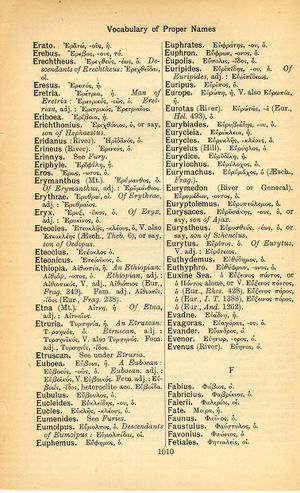Eretria: Difference between revisions
Οὐ γὰρ ἀργίας ὤνιον ἡ ὑγίεια καὶ ἀπραξίας, ἅ γε δὴ μέγιστα κακῶν ταῖς νόσοις πρόσεστι, καὶ οὐδὲν διαφέρει τοῦ τὰ ὄμματα τῷ μὴ διαβλέπειν καὶ τὴν φωνὴν τῷ μὴ φθέγγεσθαι φυλάττοντος ὁ τὴν ὑγίειαν ἀχρηστίᾳ καὶ ἡσυχίᾳ σῴζειν οἰόμενος → For health is not to be purchased by idleness and inactivity, which are the greatest evils attendant on sickness, and the man who thinks to conserve his health by uselessness and ease does not differ from him who guards his eyes by not seeing, and his voice by not speaking
m (Text replacement - "link={{" to "link={{") |
m (Text replacement - "}}]]" to "}}]]") |
||
| Line 1: | Line 1: | ||
{{WoodhouseENELnames | {{WoodhouseENELnames | ||
|Text=[[File:woodhouse_1010.jpg|thumb | |Text=[[File:woodhouse_1010.jpg|thumb | ||
|link={{filepath:woodhouse_1010.jpg | |link={{filepath:woodhouse_1010.jpg}}]][[Ἐρέτρια]], ἡ. | ||
<b class="b2">Man of Eretria</b>: Ἐρετριεύς, -ιῶς, ὁ. | <b class="b2">Man of Eretria</b>: Ἐρετριεύς, -ιῶς, ὁ. | ||
Revision as of 10:08, 15 August 2017
English > Greek (Woodhouse)
Ἐρέτρια, ἡ.
Man of Eretria: Ἐρετριεύς, -ιῶς, ὁ.
Eretrian, adj.: Ἐρετρικός, Ἐρετριαῖος.
Latin > English (Lewis & Short)
Ĕrĕtrĭa: ae, f., = Ἐρετρία.
I The principal city on the island of Euboea, the birthplace of the philosopher Menedemus, now Palaeo Castro, Plaut. Merc. 3, 4, 59; Mel. 2, 7, 9; Plin. 4, 12, 21, § 64; Cic. Ac. 2, 42; Liv. 32, 16; 35, 38 al.—
B Derivv.,
1 Ĕrĕtrĭus, a, um, adj., Eretrian: creta, Plin. 33, 13, 57, § 163; so, terra, Cels. 5, 15; 6, 3.—Subst.: Eretria, ae, f., Plin. 35, 6, 21, § 38; Vitr. 7, 14.—
2 Ĕrĕtrĭ-ensis, e, adj., of Eretria: Gongylus, Nep. Paus. 2.—Subst., Ĕrĕtrienses, ium, m., the inhabitants of Eretria, Liv. 35, 38.—
3 Ĕrĕtrĭăci, ōrum, m., philosophers of the school of Menedemus, Cic. Ac. 2, 42, 109. —Also called,
4 Ĕrĕtrĭci, ōrum., m., Cic. de Or. 3, 17; Sen. Ep. 88 fin.—In sing.: Ĕrĕtrĭcus, an Eretrian philosopher, Cic. Tusc. 5, 39.—
II A city of Thessaly, in Phthiotis, now Tzangli, Liv. 32, 13; 33, 6.
Latin > French (Gaffiot 2016)
Ĕrĕtrĭa,¹⁶ æ, f. (Ἐρετρία), Érétrie
1 [ville de l’Eubée, patrie du philosophe Ménédème] : Cic. Ac. 2, 129 || -trĭus, a, um, (-trĭēnsis, e), Érétrien, d’Érétrie : Plin. 33, 163 ; Nep. Paus. 2, 2 || -triăcī (-trĭcī), ōrum, m., les disciples de Ménédème : Cic. Ac. 2, 109 ; de Or. 3, 62 || -triēnsēs, ium, m., habitants d’Érétrie : Liv. 35, 38, 4
2 ville de Thessalie : Liv. 32, 13, 9 ; 33, 6, 10.
Latin > German (Georges)
Eretria, ae, f. (Ερετρία), I) eine Stadt bei Pharsalus in der thessalischen Landschaft Phythiotis, Liv. 32, 13, 9; 33, 6, 10. – II) eine ansehnliche Stadt auf der Insel Euböa, Vaterstadt des Philosophen Menedemus (eines Schülers Platos), des Stifters der sogen. eretrischen Schule, berühmt wegen der in ihrer Nähe gefundenen weißen Tonerde (creta), j. Palaeo-Castro, Cic. Acad. 2, 129. Liv. 32, 16, 7 sqq. – Dav.: A) Eretricus, a, um (Ερετρικός), eretrisch, philosophus, Cic. – Plur. subst., Eretricī, ōrum, m. (sc. philosophi), die eretrischen Philosophen, die eretrische Schule (Schüler des Menedemus), Cic. u. Sen.: dieselben auch Eretriacī, ōrum, m. (Ερετριακοί), Cic. Acad. 2, 129. – B) Eretriēnsis, e, aus Eretria (gebürtig usw.), eretriensisch, Nep. – Plur. subst., Eretriēnsēs, ium, m., die Einw. von Eretria, die Eretrienser, Liv. – C) Eretrius, a, um, eretrisch, creta, Plin. – Plur. subst., Eretriī, ōrum, m., die Einwohner von Eretria, die Eretrier, Mela.

